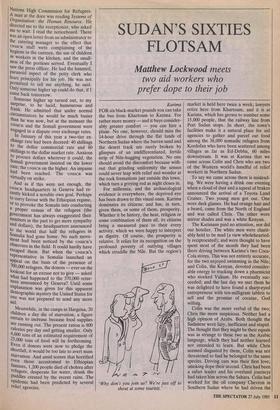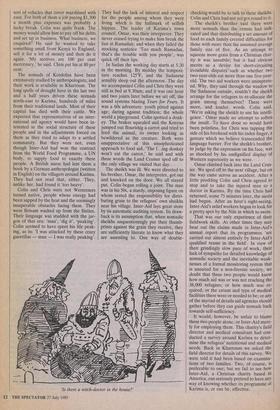SUDAN'S SIXTIES FLOTSAM
Matthew Lockwood meets two aid workers who prefer dope to their job
Karitna FOR six black-market pounds you can take the bus from Khartoum to Karima. For rather more money — and it buys consider- ably greater comfort — you can hire a plane. No one, however, should miss the 14-hour drive through the flat lands of Northern Sudan where the barren sand and the desert track are rarely broken by glimpses of an undifferentiated, fertile strip of Nile-hugging vegetation. No one should avoid the discomfort because with- out that grinding uniformity the senses could never leap with relief and wonder at the rock formations just outside this town, which turn a greying red as night closes in. For millennia, and the archaeological evidence is everywhere, the deprived eye has been drawn to this visual oasis. Karima dominates its citizens; and has, in turn, given them, or some of them, prosperity. Whether it be history, the heat, religion or some combination of them all, its citizens bring a measured pace to their every activity, which we were happy to interpret as dignity. Of course, the prosperity is relative. It relies for its recognition on the profound poverty of outlying villages which straddle the Nile. But the region's 'Why don't you join us? We're just off to shout at some tourists.' market is held here twice a week; lawyers retire here from Khartoum; and it is at Karima, which has grown to number some 15,000 people, that the railway line from Port Sudan stops. In short, the town's facilities make it a natural place for aid agencies to gather and parcel out food among the 38,000 nomadic refugees from Kordofan who have been scattered among villages as far as Ed-Debba, 60 miles downstream. It was at Karima that we came across Colin and Chris who are two of the Western world's handful of relief workers in Northern Sudan.
To say we came across them is mislead- ing. We were having a drink one evening when a cloud of dust and a squeal of brakes announced the arrival of a Toyota Land Cruiser. Two young men got out. One wore dark glasses. He had orange hair and a beard, came from the North of England and was called Chris. The other wore mirror shades and was a white Kenyan.
The Karimans paid no attention, nor did our hotelier. The white men were charit- ably held to be mad (a view wholehearted- ly reciprocated); and were thought to have spent most of the month they had been there driving between Karima's two Coca- Cola stores. This was not entirely accurate, for the two enjoyed swimming in the Nile; and Colin, the Kenyan, devoted consider- able energy to tracking down a pharmicist who stocked Valium. He eventually suc- ceeded; and the last day we met them he was delighted to have found a sharp-eyed entrepreneur with ten-milligram tablets to sell and the promise of cocaine, God willing.
Colin was the more verbal of the two; Chris the more suspicious. Neither had a high opinion of Arabs. Both thought the Sudanese were lazy, inefficient and stupid.
The thought that they might be their equals was as strange to these two as the Arabic language, which they had neither learned nor intended to learn. But while Chris seemed disgusted by them, Colin was not threatened to find he belonged to the same species. Driving cars was their first love; smoking dope their second. Chris had been a safari leader and his overland journeys had taken him across the Sahara. Colin had worked for the oil company Chevron in Southern Sudan where he had driven the sort of vehicles that cover marshland with ease. For both of them a job paying $1,300 a month plus expenses was probably a lucky break. Colin was quite frank. The money would allow him to pay off his debts and set up in business. What business, we enquired? He said he wanted to take something small from Kenya to England, sell it for a lot of money and then do it again. 'My motives are 100 per cent mercenary,' he said. Chris put his at 80 per cent.
The nomads of Kordofan have been extensively studied by anthropologists; and their work is available in Khartoum. The long spells of drought have in the last two and a half years driven these nomads north-east to Karima, hundreds of miles from their traditional lands. Most of their capital has died with their cattle. We expected that representatives of an inter- national aid agency would have been in- terested in the social structure of these people and in the adjustments forced on them as they tried to adapt to a settled community. But they were not, even though Inter-Aid had won the contract from the World Food Programme, a UN body, to supply food to exactly these people. A British nurse had lent them a book by a German anthropologist (written in English) on the villagers around Karima. They had not read that, either. They, unlike her, had found it 'too heavy'.
Colin and Chris were not Westerners turned native, people whose energy had been sapped by the heat and the seemingly insuperable obstacles facing them. They were flotsam washed up from the Sixties. Their language was studded with the jar- gon of that era: 'man', `dig it', 'peaking'. Colin seemed to have spent his life peak- ing, as in: 'I was attacked by these crazy guerrillas — man — I was really peaking'. They had the lack of interest and respect for the people among whom they were -living which is the hallmark of selfish hippies. The leader of Karima's town council, Omar, was their interpreter. They never ceased trying to make him break the fast at Ramadan; and when they failed the mocking sentence 'Too much Ramadan, that's the trouble with you people', was quick off their lips.
In Sudan the working day starts at 5.30 in the morning. By midday the tempera- ture reaches 125°F, and the Sudanese sensibly sleep out the afternoon. The day we accompanied Colin and Chris they were still in bed at 9.30am; and it was one hour and two joints later before we set off, the sound systems blaring Tears for Fears. It was a 60s adventure: youth pitted against age; daring against tradition; the whole world a playground. Colin spotted a donk- ey. The brakes squealed and the Kenyan jumped out flourishig a carrot and tried to feed the animal, its owner looking as bewildered as the creature. Both were unappreciative of this unsophisticated approach to food aid. 'The f...ing donkey won't eat the carrot,' he said and with these words the Land Cruiser sped off to the only village we visited that day.
The sheikh was ill. We were directed to his brother. Omar, the interpreter, got out and knocked on the door. We all stayed put. Cohn began rolling a joint. The man was in his 50s, a sturdy, imposing figure on whom rested the responsibility for distri- buting grain to the refugees' own sheikhs near his village. Inter-Aid lays great store by its automatic auditing system. Its draw- back is its assumption that, when nomadic sheikhs unquestioningly put their thumb- prints against the grain they receive, they are sufficiently literate to know what they are assenting to. One way of double- checking would be to talk to these sheikhs. Colin and Chris had not yet got round to it. The sheikh's brother said there were more nomads than the census had indi- cated and that distributing a set amount of food to each family created difficulties for those with more than the assumed average family size of five. As an attempt to squeeze more grain from a Christian char- ity it was unsubtle; but it had obvious merits as a device for short-circuiting avoidable disputes such as whether two two-year-olds eat more than one five-year- old. The two aid workers were unimpress- ed. Why, they said through the window to the Sudanese outside, couldn't the sheikh arrange for the refugees to re-allocate the grain among themselves? There were more, and louder, words. Colin said, 'We're asking the sheikh to use his intelli- gence.' Omar made no attempt to soften the insult. To have done so would have been pointless, for Chris was tapping the side of his forehead with his index finger, a gesture which we believe transcended the language barrier. For the sheikh's brother, to judge by the expression on his face, was as shocked by his undignified display of Western superiority as we were.
Omar climbed back into the Land Crus- ier. We sped off to the next village, but CM the way came across an accident. After a little prodding Colin and Chris agreed to stop and to take the injured man to a doctor in Karima. By the time Chris had returned, some 75 minutes later, the siesta had begun. After an hour's sight-seeing, Inter-Aid's relief workers began to look for a pretty spot by the Nile in which to swim.
That was our only experience of their fieldwork skills. At other times they may bear out the claims made in Inter-Aid's annual report that its programmes 'are carried out almost entirely by Inter-Aid's qualified teams in the field'. In view of their grindingly slow pace of work, their lack of sympathy for detailed knowledge of nomadic society and the inevitable weak- nesses of a formal monitoring system that is unsuited for a non-literate society, we doubt that these two people would know how much aid was or was not reaching the 38,000 refugees; or how much was re- quired; or the extent and type of medical facilities there were or needed to be; or any of the myriad of details aid agencies should gather before they can guide nomads back towards self-sufficiency.
It would, however, be unfair to blame these two people alone, or Inter-Aid mere- ly for employing them. This charity's field director and medical consultant had con- ducted a survey around Karima to deter- mine the refugees' nutritional and medical needs. Back in Khartoum we asked the field director for details of this survey. We were told it had been based on examina- tions of two families. Two, of course, is preferable to one; but we fail to see how Inter-Aid, a Christian charity based in America, can seriously pretend to have any way of knowing whether its programme at Karima is, or can be, effective.















































 Previous page
Previous page